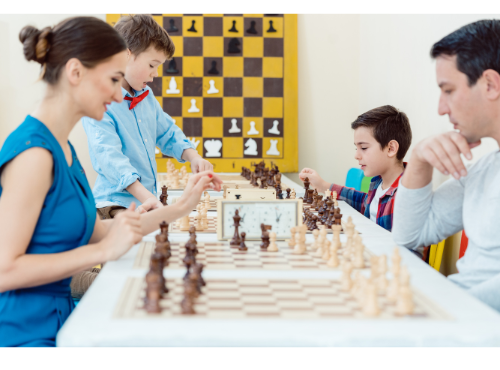
At LikeChess, we believe that chess is more than just a game; it’s a powerful educational tool that can shape young minds. Whether you’re a parent looking to introduce your child to chess or a family seeking a new, enriching hobby, this beginner’s guide will provide you with the essential tips and strategies to embark on your chess journey together.
Getting Started: Essential Tips
Here’s a step-by-step guide to help you and your child start your chess journey with LikeChess:
1. Learn the Basics: Begin by understanding the basics of chess. Familiarize yourself with the chessboard, the pieces (king, queen, rooks, bishops, knights, and pawns), and how each piece moves. There are many online resources, videos, and beginner books that can help you grasp these fundamentals.
2. Set Up a Practice Routine: Consistency is crucial when learning a new skill. Dedicate regular times each week for practice sessions. Make these sessions fun and interactive to build a positive association with the game. Remember, the goal is to enjoy the process of learning.
3. Utilize Online Resources and Apps: LikeChess offers a wealth of resources designed to teach chess to beginners. Platforms like Chess.com and Lichess provide tutorials, puzzles, and games that can reinforce learning. These platforms often feature kid-friendly interfaces and allow players to compete against others at their skill level, making learning both effective and enjoyable.
4. Join a Chess Community: Encourage your child to join a local chess club or community. Many schools offer chess clubs, and community centers or libraries often host chess events. Being part of a community can be very motivating and helps children see chess as a fun and social activity.
5. Play Together: One of the best ways to learn chess is by playing it regularly. Play chess with your child and make it a family activity. You don’t need to be an expert; learning and playing together can strengthen your bond and improve your skills. Discuss strategies and encourage your child to think about their moves.
6. Encourage Tournament Participation: Once your child is comfortable with the basics, consider entering them in local or online chess tournaments. Tournaments provide a structured environment for testing skills and can be very motivating. The experience of competing can teach valuable lessons in sportsmanship and handling both victories and defeats gracefully.
Strategies for Teaching Young Kids
1. Start Slow: Begin with basic concepts and gradually introduce more complex strategies. Don’t overwhelm your child with too much information at once.
2. Make it Fun: Use chess-themed games, puzzles, and stories to make learning enjoyable. There are many kid-friendly chess resources that turn learning into an adventure.
3. Positive Reinforcement: Celebrate your child’s progress and milestones. Positive reinforcement can boost their confidence and keep them motivated.
4. Patience is Key: Learning chess is a gradual process. Be patient and supportive. Allow your child to learn at their own pace and make mistakes along the way.
Practical Tips for Parents
1. Set Realistic Goals: It’s important to set realistic goals for your child. Encourage them to enjoy the learning process rather than focusing solely on winning.
2. Create a Chess-Friendly Environment: Ensure that the learning environment is conducive to focus and concentration. A quiet and comfortable space can make a significant difference.
3. Use Visual Aids: Visual aids like chess diagrams and online tutorials can help children understand complex concepts more easily.
4. Incorporate Chess into Daily Routine: Try to incorporate chess into your daily routine. Short, regular practice sessions are more effective than long, infrequent ones.
5. Be a Role Model: Show interest in learning chess yourself. Your enthusiasm and engagement can be very encouraging for your child.
Conclusion
At LikeChess, we are dedicated to empowering young minds through the game of chess. This guide is designed to help parents and children embark on their chess journey with confidence and enthusiasm. By integrating chess into your family activities, you can provide your child with the tools they need to succeed both on and off the board. So, set up your chessboard, make your first move, and watch as the world of chess unfolds before you, fostering a love for learning and strategic thinking in your child. Join us at LikeChess and discover the joy and benefits of this timeless game.